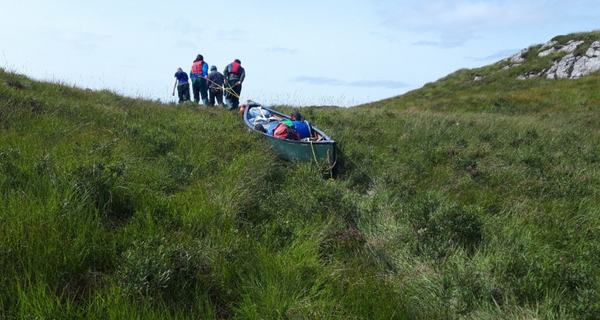Nine students, a trailer of open canoes and several kilometres of challenging terrain. This was the scene facing our four outdoor learning leaders - Dave Ogilvie, Mark Davies, Liz Thompson and Andrew Thomson at the start of their Wilderness Adventure to Inverpolly. Here Andrew Thomson shares some of the highlights and explains why these trips are so important:
The learning that happens on an expedition does not need an opposing team to turn up; it does not need to establish winners and losers; one group's success does not depend on another group's failure. This is what sets Outdoor Learning apart from the learning that takes place on a sports pitch. Students learn to cooperate, support, encourage and communicate in order to achieve an aim that every single one of the members of the group share. As young people envisage possible futures beset by overwhelming challenges isn't it these very skills we urgently need them to learn?
This belief is shared by all the Outdoor Learning leaders at ESMS and it is the reason why I found myself climbing into a mini bus with four other members of staff, nine pupils and a trailer of open canoes, and heading up to Loch Veyatie at Elphin, for one of our most challenging adventure yet.
The trip started with a canoe down Loch Veyatie and a small river called Uidh Fhearna, to an extraordinarily beautiful campsite, boasting uninterrupted views of Suilven. Having reached the campsite, turning back was not really an option, given how hard it would be to get the boats and all the equipment back up the river. Further on, Loch Fionn narrows into a river that plunges over the Falls of Kirkaig, meaning there is no exit that way either. Mobile phones had lost reception ... whether we liked it or not, we were 100% committed to undertaking a brutal portage the following day.
It was still dark at 4am when we woke to begin our climb to the summit of Suilven, using headtorches to help us ferry the group on a couple of boats, two people at a time, across the river. The dark and looming outlines of mountains added to the quiet excitement. We headed towards Suilven with the world becoming increasingly light each minute. At 7am the views from the summit were breath-taking: Elphin to the east, the Atlantic and the Summer Isles to the west and to our south, Loch Sionasgach and the winding route we were going to need to take to get home.
The descent down was simple and fun and after a midmorning breakfast we began the journey between Fionn Loch and Loch Sionasgach. The group needed to haul the boats to each lochan, paddle across it, haul the boat across to the next one, paddle across it, and so on. The total distance along the route was about two and a half kilometers – not inconsiderable. Due to the need to operate in teams of four, much of the route had to be covered three times by each person. The boats were laden with equipment and probably weighed about seventy kilograms each. It was brutal, relentless, sweaty work.
As the day went on the group was showing signs of struggle and morale was beginning to dip. The magnitude of the task had now become obvious. It was not a certainty at this point that we, as a total contingent, were capable of the challenge we had set ourselves. A small, observable change in the group dynamic now was that once a team of four had their boats to the next lochan they all turned around and came back to help the rest of the group with their boats. Everyone seemed to understand what needed to be done and that we all needed from one another. By the third leg, another shift: teams began to form dynamically and – in surprisingly little time: you could feel we were going to make it.
The final leg was the longest and hardest yet. The group prepared itself for the challenge ahead. There was no complaining. Every single member of the group got fully involved in the effort. Everyone seemed to accept that no one would be finished until everyone was finished. They dynamically formed teams to help one another with their boats, with one group in charge of porting the boats to the fence and making the 400m return trip for the next one and the other group unloading them, lifting them over the fence, passing the equipment across and repacking them. The final haul, from the fence to Loch na Dail, was short but involved a steep drop down to the loch. But there, on the other side of the lochan, were waiting for us the bus and trailer.
It had been a fifteen and a half hour day, significantly longer than planned . But, equal to that, the group had achieved far more than we had originally set out to achieve. Despite the gruelling day they were buoyant and excited. And what we had done out there felt significant.
By Mr Thomson
Head of Department, SMC Computer Studies



